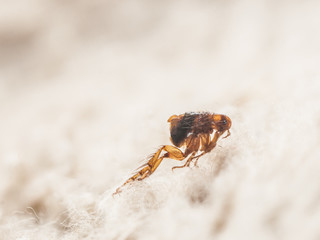Table of Contents
Boric acid is a natural mineral that’s found in some types of soil, and it can act as a flea repellent. So, if you have pets and deal with fleas, boric acid may help. It’s also safe for most animals. Boric acid doesn’t kill fleas on contact, but it may hamper their ability to groom and lay eggs. Boric acid has only limited repellency properties. It’s also not very effective against other common household pests such as mosquitoes or ants. However, there are alternatives to boric acid that are more effective at repelling fleas.
If you’ve got a flea problem, RECON Pest Services is here to help. Servicing the Omaha & Lincoln areas, contact us today for a free quote.
How does boric acid work as a flea repellent?
Boric acid works as a flea repellent by causing dermatitis in the flea. The substance irritates the flea’s skin, causing it to groom less often than it would otherwise. Because fleas groom themselves, grooming less is the main way that boric acid causes dermatitis.
Boric acid is not very effective as a direct flea killing agent. When applied to the skin, it takes several hours for the substance to be absorbed. It’s also not very stable on the skin, so it’s not very effective against fleas that bite the animal while it’s wearing the substance. Boric acid may not be effective as a flea repellent in some cases. If your pet has a flea infestation, boric acid may not be an effective flea treatment. Fleas can be very difficult to treat. For example, some flea treatments may not work on your pet, or they might cause them to develop side effects.
Safety precautions for boric acid for fleas
Boric acid for fleas is safe to use on dogs, cats, rabbits, and other animals. However, it’s not recommended for use on humans. Boric acid can cause dermatitis in some people. So, if you have pets, it’s best to wash your hands before and after touching the substance so that you don’t spread the rash to your own skin. It’s also best to wear rubber gloves when handling boric acid for fleas. It’s better to be safe than sorry when it comes to safety precautions.
Is boric acid safe to use as a flea repellent?
In general, boric acid is safe to use on dogs and cats. Like many products containing boric acid, it’s most effective when applied to the skin. Therefore, it’s only safe to apply to your pet’s body. Boric acid is not absorbed into the pet’s bloodstream, so it’s not dangerous.
However, it may be less effective as a flea treatment than other options. So, it may be less effective than other flea treatments, and it may not be safe to use on dogs that naturally have sensitive skin. Boric acid for fleas is not recommended for use on dogs or cats that naturally have sensitive skin.
How to make your own boric acid for fleas
Boric acid for fleas can be purchased in many grocery stores, pet stores, and online. However, making your own boric acid for fleas is safer, cheaper, and more effective than purchasing it. Boric acid is found naturally in some soils. It’s also used in some ant and termite bait products.
Boric acid is an organic salt based compound. It’s a white crystal with a strong, bitter taste and an odor of ammonia. Boric acid is not very soluble in water. You can make boric acid for fleas by adding ammonia to the substance.
The resulting boric acid is highly soluble in water. It may take some experimenting to find out how much ammonia is needed to make boric acid for fleas. Boric acid is not very soluble in water. You can make boric acid for fleas by adding ammonia to the substance.
For a more specific recipe, check out this article.
Summing up
Boric acid for fleas is safe to use on dogs, cats, rabbits, and other animals. It’s also safe to use on humans. Boric acid is not very effective as a flea killing agent. It can be dangerous to humans, and it’s not very effective against other common household pests such as mosquitoes or ants. Boric acid can be made at home by adding ammonia to the substance.
It’s more effective and safer to make at home than purchasing it. Boric acid for fleas can be used safely in most cases. It’s effective against fleas, ants, and some types of mosquitoes. However, it may not be as effective as other options, and it may not be safe to use on dogs and cats that naturally have sensitive skin.





